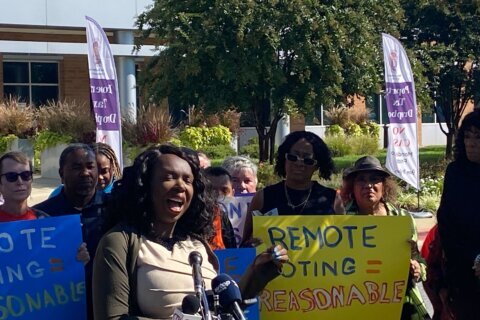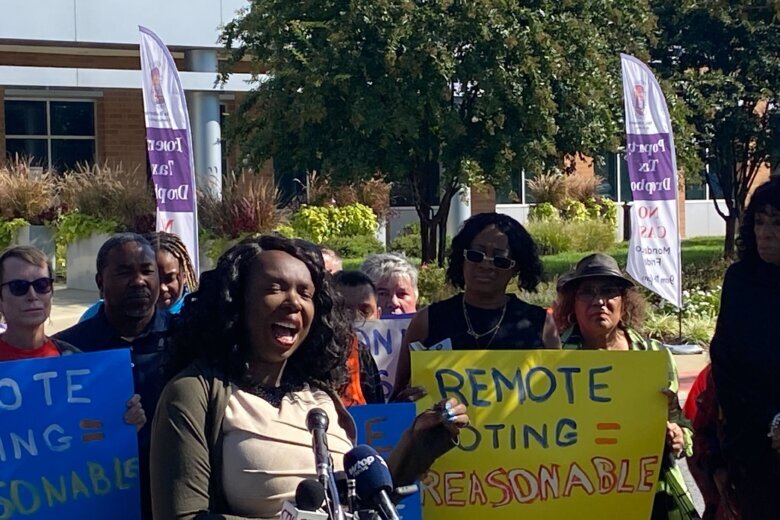
Long-simmering tensions exploded into the open earlier this month when the Prince George’s County Council initially rejected a rules change that would have allowed members of the council to attend meetings and vote on legislation virtually.
The initial 5-5 vote two weeks ago quickly led supporters of the measure to denounce colleagues, saying they were deliberately targeting District 7 Council member Krystal Oriadha, who is due to give birth in about two weeks.
While some members argued against the change by talking about tradition and process, at least one admitted it, saying it was specifically because of political disagreements with Oriadha. That led to a rally outside the council chambers last week, which was subsequently followed up by an apparent olive branch.
On Tuesday, that branch was delivered to Oriadha and more progressive members of the council, after a revote on the issue passed 8-0, with three members abstaining.
Council member Jolene Ivey, who was out sick two weeks ago, attended the meeting to cast her vote this time. At-large Council member Calvin Hawkins, who lashed out at Oriadha the first time, as well as at-large member Mel Franklin changed their votes.
“I want the council and the public to be aware that I apologized to Councilwoman Oriadha last week following remarks I made that were insensitive, emotional and not at all indicative of my belief, character or commitment to all the residents of Prince George’s County and beyond,” Hawkins said.
He said he wanted “to be honest and forthright in acknowledging and apologizing for remarks that were hurtful, insensitive and not reflective of my respect and appreciation and admiration for all women,” Hawkins added.
Those comments came right after Franklin spoke, explaining his change of heart too.
“I think it’s important to bring some unity to this body,” Franklin said. “I want to hopefully see this council become more unified.”
He added, “If we’re not united, we will not live up to our full potential.”
Oriadha turned and publicly thanked the two for the change of heart, acknowledging private apologies they expressed to her over the last two weeks too.
“I can appreciate that,” she said. “With their two votes this will be able to pass.”
A supermajority of the council, eight of 11 votes, was needed to pass the measure. Oriadha said this was something she and other members of the council have spent most of the year working on with council attorneys. The rule change still needs to pass through one more vote before it takes effect, and that vote is expected to be held one week from today.
While no one voted against it this time, three members — Sydney Harrison, Ingrid Watson and Wanika Fisher — abstained from the vote. Afterward, Harrison and Fisher both said their decision to abstain was more about process and procedures for the council than anyone in particular.
“It was never about anyone in particular,” Harrison said. “I do believe we have to embrace innovation and technology and how that works with government to better serve the people.”
But he also said he believed that council members should be there, if members of the public who want to speak about legislation being taken up by the county have to provide comment in-person.
“We approved it for us, but we didn’t approve it for the public,” he said.
“This is all about rules and procedures and what we’re comfortable with,” Fisher said. She reiterated how much serving in the House of Delegates in Annapolis influenced her sentiments on this, saying a constitutional requirement that she be there to vote on state legislation influenced her on this matter.
“I believe in us taking some innovation to approaches but I think we have to do it holistically with experts and really figure it out,” Fisher said.
Going into the vote there was talk about some amendments being offered, including one that would have included allowing council members to attend hearings and cast votes virtually up to five times for any reason. However no amendments were taken up this time.
“This should not have been a political debate,” Oriadha said. “We thought this was a reasonable accommodations bill that made sense and impacted everyone.
“I thought this was just common-sense legislation that made sense so we could govern,” she added. “I’m sad that some people couldn’t see past that and just do the right thing.”








